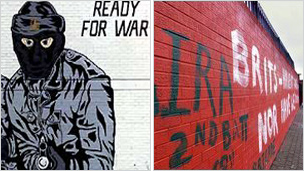L’inerzia della PSNI nelle aree repubblicane e lealiste hanno creato un vuoto riempito dalle formazioni paramilitari, secondo quanto riportato in uno studio universitario

Hanno detto che le loro testimonianze hanno mostrato come la PSNI non sia riuscita a soddisfare le aspettative dell’epoca post-Patten.
La PSNI ha contestato le conclusioni della relazione.
I criminologi hanno intervistato gruppi comunitari, politici e agenti PSNI.
Il dottor John Topping del Centre for Policing Studies (Centro sugli Studi di Polizia) dell’ateneo ha detto che la PSNI ha mancato di affrontare le paure su criminalità e comportamenti anti-sociali.
“Questo ha portato ad una crescente accettazione della «polizia» paramilitare dove c’è un vuoto evidente di polizia, con i paramilitari come «imprenditori» che cercano di sfruttare le lacune”, ha detto il dottor Topping.
Un lealista ha risposto al dottor Topping affermando che “ogni area ha un’influenza paramilitare ed i politici e i boss della PSNI stanno nascondendo la testa sotto alla sabbia”.
“Io vivo in una zona della classe operaia lealista e (con il servizio di polizia) non è cambiato niente – o forse, è peggiorato.
“Questa influenza paramilitare è stata nascosta sotto il tappeto dai politici, e la polizia la non affronta.
“In alcune aree, esseri visti parlare con la polizia è tuttora considerato un lavoro da informatore”.
Un intervistato repubblicano ha detto che c’era un “attesa” per la giustizia paramilitare “perché le persone sono sempre così frustrate”.
Topping afferma che lo studio ha indicato che il lavoro necessario per “cambiare i cuori e le menti” delle comunità per quanto riguarda i paramilitari era stato sottovalutato sia dalla PSNI che dai politici.
Il documento ha inoltre accertato che l’efficacia del Public Prosecution Service (Pubblico Ministero) e l’eredità dei Troubles stanno interessando la volontà di impegnarsi con la polizia.
In un comunicato, la PSNI ha detto che il rapporto ha preso “un approccio monodimensionale per un argomento molto complesso”.
Ha detto che la questione del paramilitarismo e degli attacchi in stile paramilitare sono chiaramente un problema di polizia, ma nessuno che gestisce un sistema di polizia può fornire una soluzione in isolamento.
La dichiarazione afferma che “mentre noi svolgiamo un ruolo essenziale nella lotta contro questo tipo di attività criminale, va riconosciuto che ci sono anche responsabilità fondamentali che coinvolgono i leader della comunità ed i politici”.
Tratto da BBC News
Paramilitaries fill PSNI ‘inertia’ vacuum – report
PSNI “inertia” in loyalist and republican areas has created a vacuum being filled by paramilitaries, according to a university study.
They said their evidence showed the PSNI had failed to meet expectations in the post-Patten era.
The PSNI said it disagreed with the report’s findings.
Criminologists interviewed community groups, politicians and PSNI officers.
Dr John Topping from the university’s Centre for Policing Studies said the PSNI was failing to address fears about crime and anti-social behaviour.
“This has resulted in a growing acceptance of paramilitary ‘policing’ where there is a clear policing vacuum, with paramilitaries as ‘entrepreneurs’ seeking to exploit the gaps,” Dr Topping said.
One loyalist told Dr Topping that “every area has got paramilitary influence and the politicians, the bosses in the PSNI, are burying their heads”.
“I live in a loyalist working class area and it (policing) hasn’t changed one bit – if anything, it has got worse.
“This paramilitary influence has been brushed under the carpet by the politicians, and the police don’t deal with it.
“In some areas, even being seen talking to the police is still considered informing.”
One republican interviewee said that there was a “palate” for paramilitary justice “because people are getting so frustrated”.
Dr Topping said the study indicated that the work needed in “changing the hearts and minds” of communities regarding paramilitaries had been underestimated by both the PSNI and politicians.
The paper also found that the effectiveness of the Public Prosecution Service and the legacy of the Troubles was affecting willingness to engage with police.
In a statement, the PSNI said the report took “a one-dimensional approach to a very complex subject”.
It said the issue of paramilitarism and paramilitary-style attacks is clearly a policing issue, but not one that policing can deliver a solution to in isolation.
The statement said “whilst we play a key role in tackling this type of criminal activity, it should be recognised that there are also key responsibilities that involve community and political leaders”.